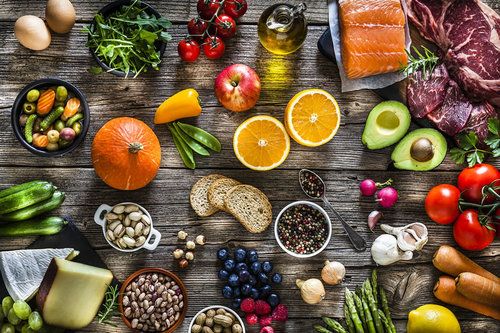Don't Miss Events
Enjoy a Healthy and Balanced Diet

Nutrition is an essential part of a healthy lifestyle. Learn the basics of healthier eating habits.
- Include a healthy eating planthat consists of fruits, vegetables, whole grains, fat free or low-fat milk and other dairy products, and lean meats. You can also add to or substitute dairy products with lactose-free versions and fortified soy beverages and yogurts. Your eating plan should be low in salt, saturated and trans fats, and added sugars. Learn more healthy eating tips.
- If you could become pregnant, take 400 micrograms of folic acid every day. Taking folic acid before and during pregnancy reduces the risk that the baby will have a major birth defect of the brain or spine.
- Avoid drinking too much alcohol. Excessive alcohol use has immediate effects that increase the risk of many harmful health conditions and can lead to chronic diseases. If you choose to drink alcohol, do so in moderation, which is up to 1 drink a day for women. Check your drinking habits and make a plan to drink less alcohol.
Get Active
Move more and sit less. Every little bit of physical activity helps. Start small and build up to 2 hours and 30 minutes a week. You can break it into smaller amounts of time, such as 20 to 30 minutes a day.
Get out and about and enjoy the spring and summer weather. Physical activity is one of the most important things you can do for your health. Physical activity has many benefits, including lowering your risk for heart disease—the leading cause of death for women.
Get out and about and enjoy the spring and summer weather. Physical activity is one of the most important things you can do for your health. Physical activity has many benefits, including lowering your risk for heart disease—the leading cause of death for women.
- Adults should do at least 2 hours and 30 minutes each week of aerobic physical activity that requires moderate effort. You don’t have to do it all at once.
- Adults should do strengthening activities at least 2 days a week that include all major muscle groups.
- More than one out of four older people falls each year and women fall more often than men. Strength and balance training can help reduce falls.
Keep your mind and body healthy.
Research shows that positive mental health is associated with better overall health and well-being. There are some important steps you can take to get the support you need to cope with stress and improve your well-being.
Welcome to MBC News
Just a section to find random information, recipes and many interesting post
About Mental Health
What is mental health?
Mental health includes our emotional, psychological, and social well-being. It affects how we think, feel, and act. It also helps determine how we handle stress, relate to others, and make healthy choices. Mental health is important at every stage of life, from childhood and adolescence through adulthood.
Why is mental health important for overall health?
Mental and physical health are equally important components of overall health. For example, depression increases the risk for many types of physical health problems, particularly long-lasting conditions like diabetes, heart disease, and stroke. Similarly, the presence of chronic conditions can increase the risk for mental illness.
Can your mental health change over time?
Yes, it’s important to remember that a person’s mental health can change over time, depending on many factors. When the demands placed on a person exceed their resources and coping abilities, their mental health could be impacted. For example, if someone is working long hours, caring for a relative, or experiencing economic hardship, they may experience poor mental health.
How common are mental illnesses?
Mental illnesses are among the most common health conditions in the United States.
What causes mental illness?
There is no single cause for mental illness. A number of factors can contribute to risk for mental illness, such as
Credit to https://www.cdc.gov/mentalhealth/learn/index.htm
Mental health includes our emotional, psychological, and social well-being. It affects how we think, feel, and act. It also helps determine how we handle stress, relate to others, and make healthy choices. Mental health is important at every stage of life, from childhood and adolescence through adulthood.
Why is mental health important for overall health?
Mental and physical health are equally important components of overall health. For example, depression increases the risk for many types of physical health problems, particularly long-lasting conditions like diabetes, heart disease, and stroke. Similarly, the presence of chronic conditions can increase the risk for mental illness.
Can your mental health change over time?
Yes, it’s important to remember that a person’s mental health can change over time, depending on many factors. When the demands placed on a person exceed their resources and coping abilities, their mental health could be impacted. For example, if someone is working long hours, caring for a relative, or experiencing economic hardship, they may experience poor mental health.
How common are mental illnesses?
Mental illnesses are among the most common health conditions in the United States.
- More than 1 in 5 US adults live with a mental illness.
- Over 1 in 5 youth (ages 13-18) either currently or at some point during their life, have had a seriously debilitating mental illness.
- About 1 in 25 U.S. adults lives with a serious mental illness, such as schizophrenia, bipolar disorder, or major depression.
What causes mental illness?
There is no single cause for mental illness. A number of factors can contribute to risk for mental illness, such as
- Adverse Childhood Experiences, such as trauma or a history of abuse (for example, child abuse, sexual assault, witnessing violence, etc.)
- Experiences related to other ongoing (chronic) medical conditions, such as cancer or diabetes
- Biological factors or chemical imbalances in the brain
- Use of alcohol or drugs
- Having feelings of loneliness or isolation
Credit to https://www.cdc.gov/mentalhealth/learn/index.htm
Prioritize Mental Health
What you can do
- Take five. Take a deep breath and relax. Even five minutes to take care of yourself can help.
- Be active. Take a walk, stretch, or exercise.
- Connect with others. Reach out to friends and family.
- Seek support from friends, family, and trusted organizations. Talk about your feelings with others. Reach out to clergy or others in your faith community.
- Get help from a professional. Talk to a health care provider about how you are feeling.
- Make an appointment with a counselor.
- Contact the 988 Suicide & Crisis Lifeline. If you or someone you know is struggling or in crisis, help is available. Call or text 988 or chat 988.
- Take time to unwind and enjoy your favorite activities.
Weekly Recipe
Easy Baked Chicken Tenders
These baked chicken tenders have a deliciously crispy panko bread crumb coating for that extra crunch factor without the guilt of frying! You can marinate the tenders in light buttermilk in the refrigerator for 1 hour instead of dipping in the beaten egg.

Ingredients
- cooking spray
- 1 large egg, beaten
- 1 ¼ cups panko bread crumbs
- 2 teaspoons garlic powder
- 1 teaspoon onion powder
- 1 teaspoon ground paprika
- 1 teaspoon kosher salt
- 1 teaspoon ground black pepper
- 4 skinless, boneless chicken tenders, cut into 1/2-inch strips lengthwise
Prep Time: 15 mins
Cook Time: 15 mins
Cook Time: 15 mins
Total Time: 30 mins
Servings: 4
Servings: 4
-Gather all ingredients.
-Preheat the oven to 450 degrees F (230 degrees C). Line a baking sheet with aluminum foil and spray with cooking spray.
-Place egg in a shallow dish. Place panko, garlic powder, onion powder, paprika, salt, and pepper into a large zip-top freezer bag and mix well.
-Dip 2 chicken strips into egg, then place into panko mixture and shake to coat. Place coated chicken pieces onto the prepared baking sheet. Repeat with remaining chicken.
-Spray each chicken tender with cooking spray twice.
-Bake tenders in the preheated oven for 7 minutes. Flip and continue to bake on opposite side until no longer pink in the centers, about 7 minutes more. Remove from the oven.
-Set an oven rack about 6 inches from the heat source and preheat the oven's broiler.
-Broil tenders in the preheated oven for extra crunch, about 1 to 2 minutes more.
Serve hot and enjoy!
-Preheat the oven to 450 degrees F (230 degrees C). Line a baking sheet with aluminum foil and spray with cooking spray.
-Place egg in a shallow dish. Place panko, garlic powder, onion powder, paprika, salt, and pepper into a large zip-top freezer bag and mix well.
-Dip 2 chicken strips into egg, then place into panko mixture and shake to coat. Place coated chicken pieces onto the prepared baking sheet. Repeat with remaining chicken.
-Spray each chicken tender with cooking spray twice.
-Bake tenders in the preheated oven for 7 minutes. Flip and continue to bake on opposite side until no longer pink in the centers, about 7 minutes more. Remove from the oven.
-Set an oven rack about 6 inches from the heat source and preheat the oven's broiler.
-Broil tenders in the preheated oven for extra crunch, about 1 to 2 minutes more.
Serve hot and enjoy!